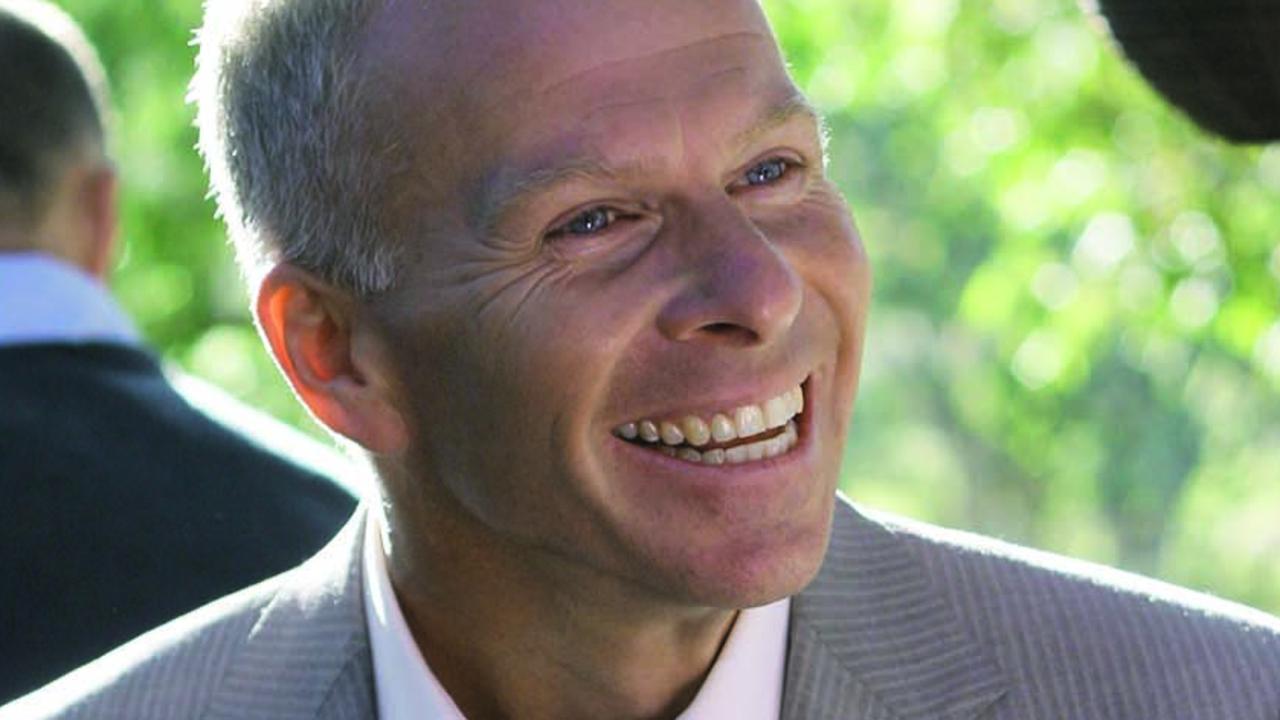Simon Overland's role in aborted murder probe
SIMON Overland divulged intelligence from a phone tap, unwittingly triggering the collapse of a murder investigation.
VICTORIA Police Chief Commissioner Simon Overland divulged secret intelligence from a phone tap, unwittingly triggering the collapse of a murder investigation because he wanted to avoid media scrutiny of his proposed attendance at a taxpayer-funded management course in France.
Mr Overland passed on information picked up from a phone tap to a colleague, the then police media manager Stephen Linnell, in a bid to quash a potentially embarrassing rumour about his legitimate trip to Fontainebleau in France before it went public - and this triggered a series of subsequent indiscretions by others resulting in Operation Briars collapsing, The Australian can reveal.
Mr Overland's action in August 2007 as deputy commissioner initiated the series of related leaks that led to the secret phone tap being exposed to the target of Operation Briars, then sergeant Peter Lalor, within 48 hours.
Mr Lalor, no longer a police officer, strenuously denies any wrongdoing and has not faced any charges.
Mr Overland's conduct is proved by his affidavit to the Office of Police Integrity as well as transcripts of intercepts, other testimony, and the findings of the OPI in 2008 after its controversial inquiry leaks surrounding Operation Briars, The Australian's investigation has found.
Operation Briars - a joint probe by the OPI and police - started in early 2007 after a hitman claimed that he had killed male prostitute Shane Chartres-Abbott, known as The Vampire, in 2003 after Mr Lalor allegedly disclosed his address to the hitman.
The documents, which show Mr Overland's conduct was motivated by concern for his image and how it would be adversely affected by gossip on Melbourne Radio 3AW's Rumour File, raise serious questions.
There was no operational need for him to pass on the intelligence, which came after he had insisted on secrecy rules to ensure operational details were not disclosed.
Mr Linnell was not to have received operational intelligence such as that obtained from telephone taps.
Mr Overland's sharing of operational intelligence from a telephone tap to media-manage what would have been a trivial and temporarily embarrassing story was an affront to policing and possibly illegal, according to senior lawyers and investigators.
The OPI and Mr Overland did not answer detailed questions from The Australian yesterday.
Mr Overland, who never went on the trip to France, said through a spokeswoman, Nicole McKechnie: "Our comment is that our advice is that the Chief Commissioner has not committed an offence."
OPI spokesman Paul Conroy said: "As presently advised, OPI lawyers do not consider that the claims raised show a breach of the telephone intercept legislation."
Experienced criminal lawyer and Civil Liberties Council president Terry O'Gorman, who has no connection to the parties in Victoria, said the evidence was compelling, extremely serious and he believed it warranted urgent investigation by an interstate body with no connection to the OPI or to Mr Overland. Mr O'Gorman said it appeared from Mr Overland's affidavit that he passed on intelligence from a telephone tap to protect his own career.
"In my view there is a worrying set of facts here," Mr O'Gorman said.
"One of the questions is why all the terms of his affidavit were not made public by the OPI (during its public hearings in late 2007).
"I believe it needs to be jumped on and investigated by outsiders - and Mr Overland should be put through the same disciplinary process that others were put through. That (his disclosure) got back to the target makes it even worse."
Mr Overland stated in his affidavit that he received a call on August 14, 2007, from the head of the taskforce for Operation Briars, Superintendent Rod Wilson, who gave him a heads-up about an intercepted phone conversation that morning between Mr Lalor and the then secretary of the Police Association, Paul Mullett.
Mr Overland stated that Mr Wilson explained that "we've just picked up over the line".
He added that "it was something to the effect that Paul Mullett and Peter Lalor were talking about me going off to Fontainebleau".
Mr Overland stated: "Rod said, 'look, they're talking about leaking it to the media, they're talking about running (it) through the Rumour File'."
Mr Overland went to see Mr Linnell, to pass on the intelligence and it appears from his affidavit that he was doing it to hose the story down. "I went back to Linnell and I said, 'Look, you just need to be aware I've just got a call from Rod'.
"I did not specifically say TI (telephone intercept) but I said, 'I understand Mullett and Lalor are talking about this. I understand they're going to run it through 3AW so it's going to be a Rumour File story. You need to watch it'.
"I was sensitive about that matter because I had a previous experience with the Rumour File, where Mullett ran a story through the Rumour File about me.
"Radio station 3AW picked it up and started reporting it as a news item without actually coming back to me. I actually rang the news director down there. They only ran it once. They then pulled it off because it simply was not true. But I knew Mullett was behind it. So I thought, 'Well, they'll do the same thing with this. They'll just set me up'."
The discussion between Mr Mullett and Mr Lalor was recorded in a phone tap because Mr Lalor was the unknowing target of Operation Briars.
By August 16, 2007, and as a direct result of Mr Overland's disclosure, knowledge of the tapped conversation had been related by Mr Linnell to his friend and mentor, assistant commissioner Noel Ashby, who warned Mr Mullett, who in turn sent a warning to Mr Lalor via the union's president, Brian Rix.
Former National Crime Authority member, Criminal Justice Commission investigations chief and deputy director of public prosecutions Mark Le Grand said he was stunned by the contents of Mr Overland's affidavit when he was asked to review it by The Australian.
He said that on his interpretation of the Commonwealth Telecommunications (Interception and Access) Act 1979, "it was an indictable offence for a person to communicate to another person, or make use of, lawfully intercepted telecommunications information otherwise than in conformity with the act".
Mr Overland and the OPI reject claims there was a breach.
Mr Le Grand said: "It appeared that the now Chief Commissioner of the Victoria Police, the principal law enforcement officer in that state in command of all police, had communicated, and made use of, telephone interception information obtained under warrant in a murder investigation to his media manager to protect himself from possible personal embarrassment. This is just extraordinary stuff from the officer who is supposed to control the force, to superintend investigations, to ensure discipline and to enforce compliance with the law.
"You cannot just go out and disseminate information from a telephone intercept because you don't want to be embarrassed in the media."
Mr Mullett said he believed at the time that Mr Lalor was unfairly being investigated as the anonymous author of a newsletter that had infuriated the police hierarchy. He added that he had no idea that Mr Lalor was the target of a covert murder investigation.
Mr Overland documented his conduct in the affidavit sworn and signed on November 1, 2007, after an interview with two OPI investigators in the previous month.
But the affidavit was not made public during the OPI's public hearings held just days later under the supervision of OPI inquiry chief Murray Wilcox QC, a former Federal Court judge.
The affidavit was not disclosed until the unsuccessful prosecution of Mr Mullett last year. The OPI made no finding about Mr Overland's motives or conduct.
However, Mr Wilcox made scathing findings in his 2008 report, Exposing Corruption Within Senior Levels of Victoria Police, against Mr Ashby, Mr Mullett, and Mr Linnell, all of whom quit their jobs in disgrace and were prosecuted.
Mr Mullett and Mr Ashby were acquitted, while Mr Linnell co-operated and pleaded guilty.
During the OPI inquiry in 2007 the three men were accused of leaking information about Operation Briars and its telephone taps - information arising from Mr Overland's original disclosure to Mr Linnell.
The OPI inquiry found that Mr Lalor was warned it would not be safe to use his phone.
The OPI has always been aware of Mr Overland's detailed evidence about his pivotal role in disclosing the information that started the leaks. However, it neither called him as a witness to the OPI public hearings, nor analysed in its public report the impact of his disclosures on Operation Briars. There was no adverse mention of Mr Overland in the OPI's report, and early last year he was elevated to Chief Commissioner, to replace Christine Nixon.





